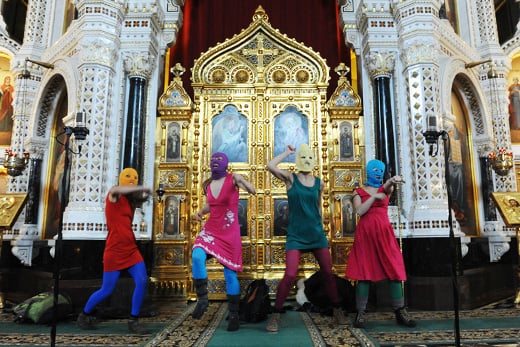
Photo: courtesy MoMA PS1.
Artists in war-torn countries have a new ally: the Artist Protection Fund (APF), the creation of which was announced today by the Institute of International Education. In cases where artists face persecution, AFP will provide support and relief in the form of fellowship grants designed to help them pursue their work in other countries.
To understand the need for such am initiative, one needs to look no further than the headlines: in recent years, artists such as Tania Bruguera, Ai Weiwei, and Pussy Riot have all been imprisoned for their politically-charged work (see Tania Bruguera Detained During Havana Biennial, Shepard Fairey Makes Ai Weiwei Poster to Fund Free Speech Organization, and Pussy Riot Sues Russia).
The program, which will begin with a three-year pilot stage, is supported by a $2.79 million grant from the Andrew W. Mellon Foundation. Artists can apply directly to APF, or can be nominated.
IIE hopes to pair artists from a wide range of disciplines with host universities or art centers, and is calling on international arts organizations to lend their support to APF. Participating organizations, which can include college-level art education programs, performing arts organizations, and artist residencies, among other artistic communities, are required to match the artist’s grant, whether it be by offering housing, studio space, art supplies, or other means of support.
Throughout its 96-year history, part of IIE’s mission has been to provide aid to scholars and artists around the world. Those efforts were formalized in 2002, with the foundation of the Scholar Rescue Fund, of which the APF is an extension. The fund has since helped 600 scholars from 53 countries around the world, removing them from dangerous situations and providing them the freedom to pursue their scholarly work without fear of reprisal.
“The arts and rescue have been in a sense part of our DNA,” noted IIE president Allan Goodman in a conversation with artnet News. Artists who are also professors have participated in the Scholar Rescue Fund in the past, but the new program extends that same aid to artists who have no prior affiliation with a university.
Under repressive regimes, artists who dare use their art as a means of political critique can face violence, imprisonment, and even death. “The program will enable their work and voices to continue to be seen and heard, which, as many artists tell us, is of critical importance to them,” said Mariët Westermann, vice president of the Mellon Foundation, in a statement. “The benefits will accrue to the artists and their families; their host and home communities; and the larger world in which their art can continue to play a prominent role.”
IIE founded APF following a convention of international arts organizations and experts that it hosted this past October. The group found that while there was existing emergency support to help remove artists from harm’s way, there was an unmet, critical need for long-term support to help them continue their work after fleeing unstable countries. Thanks to its work with the Scholar Rescue Fund, APF was uniquely-suited to fill this need.
“We have a methodology of how to rescue people, and we have partnerships with universities with performing arts spaces, writers’ programs, and studio spaces,” said Goodman. Crucially, the program will provide haven not only for the artists, but any family members they might have. “Even though the grant is for the scholar or the artist, it embraces a whole family,” Goodman added.
He expects that the initial Mellon grant will allow the institute to offer 30 grants during APF’s pilot stage, but suspects that the number of applicants may be so large that the funds will not last a full three years. “We actually have no idea how big the demand will be,” Goodman admitted. “We’re probably going to be shocked at how many applications we get from all over the world.”
“This is not a refugee program,” added Goodman. His hope is that participating artists can preserve and continue to build upon their body of work, so that it can one day be experienced again in their native land.